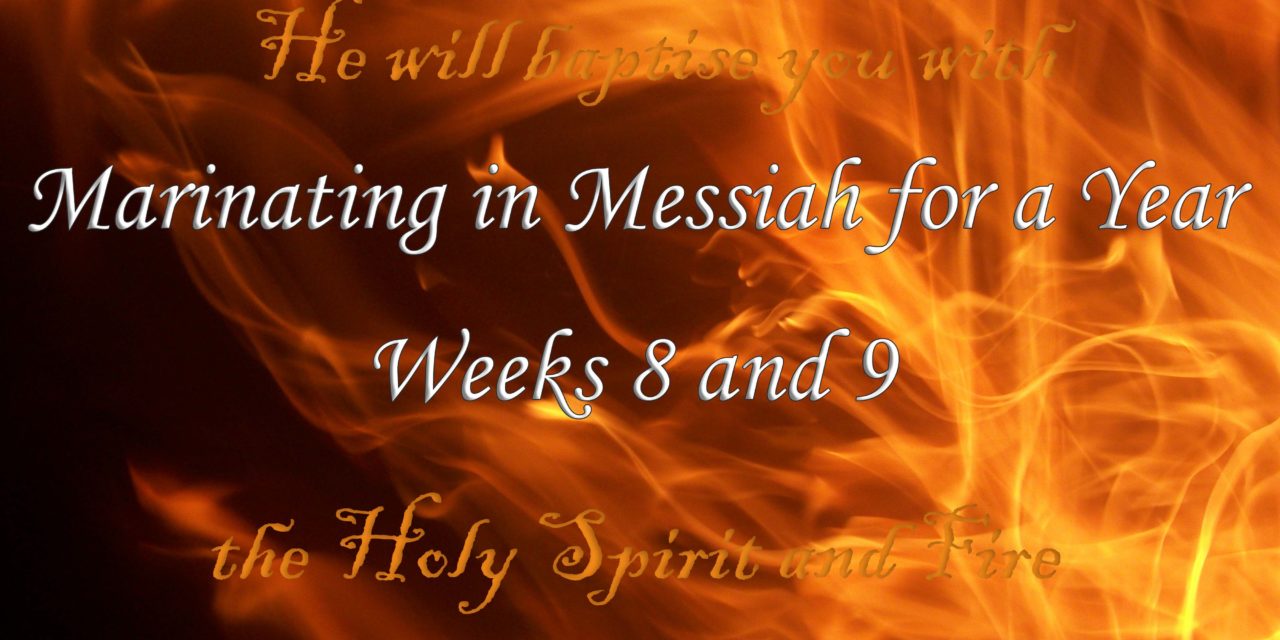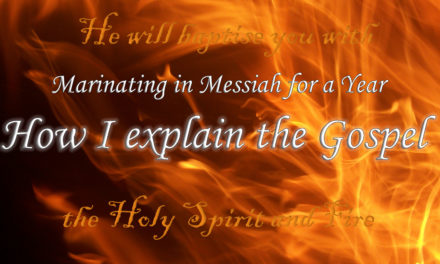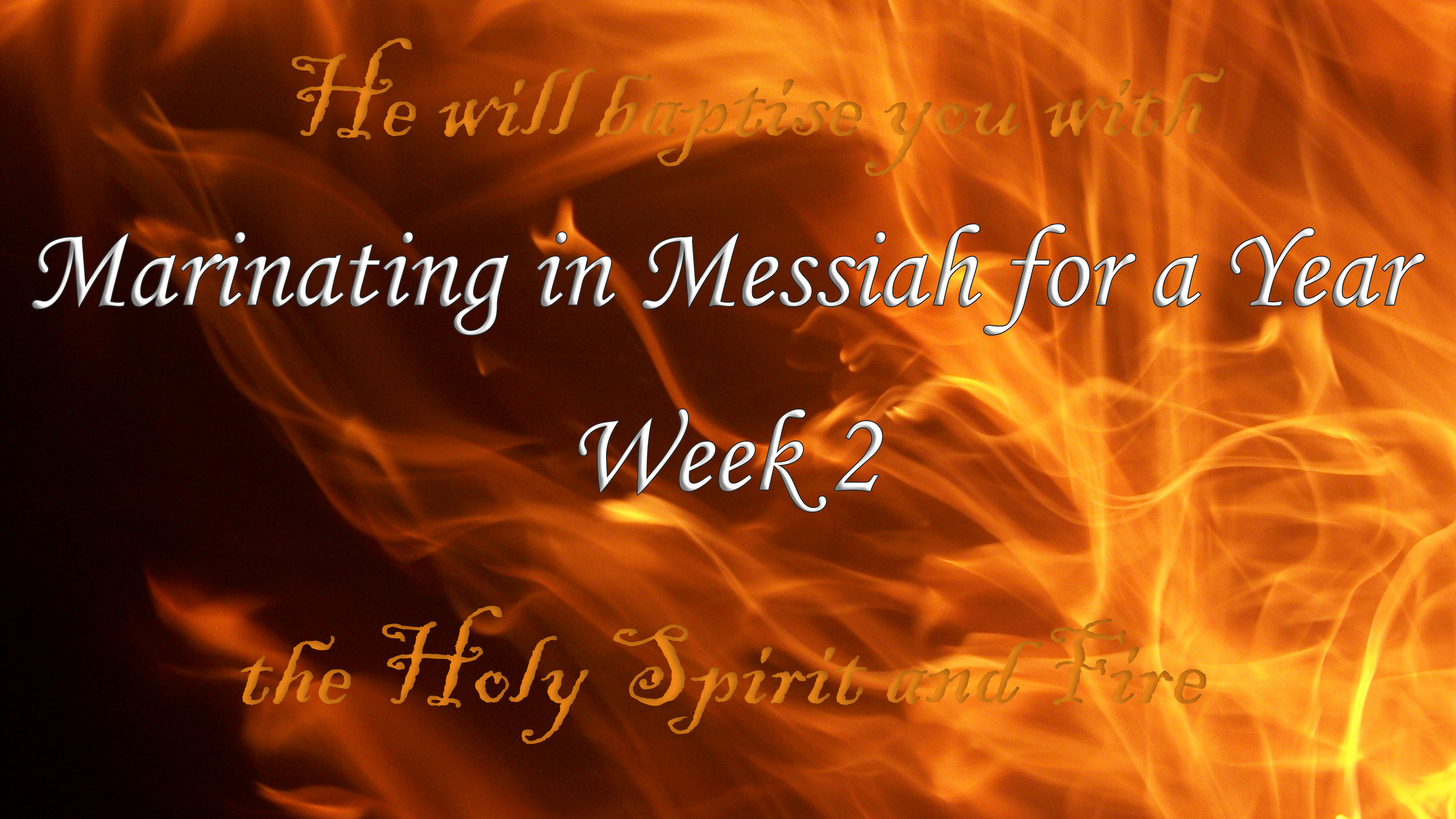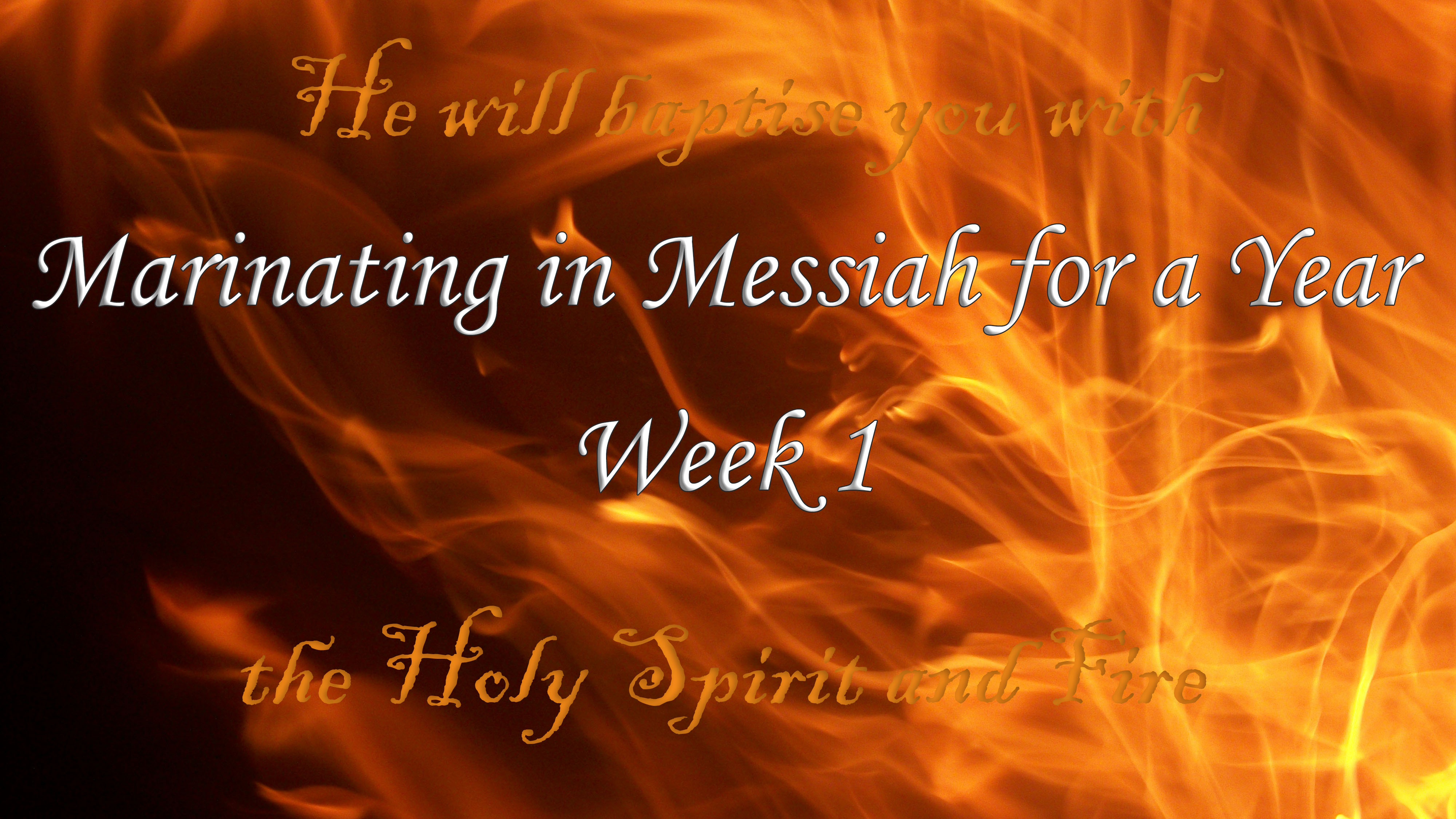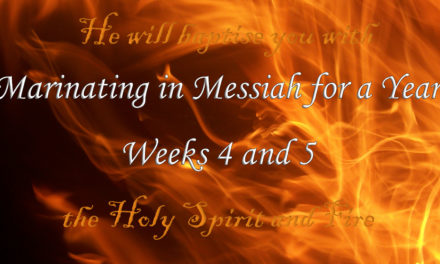Just FYI, I was on Sabbatical for Weeks six and seven, so nothing is actually missing. I got grumpy, and writing grumpy is too much like driving drunk when you are in any sort of writing ministry. You need to get off the road and stay off. We all need a break from time to time.
Marinating in Messiah for a Year–Day 49
Yeshua/Jesus never said that we wouldn’t have fear, He just put fear into perspective. I like that. Sometimes He chided the disciples for being afraid when there was nothing wrong, and at other times He told them to direct their fear towards God, because He was the only one who could permanently harm them. But He never said anything like “Fear is false evidence appearing real” or any other sort of diminutive or demeaning mantra. When your child is dying of cancer, fear is very real and I can’t see Yeshua walking into the PICU rebuking moms and dads over what they see happening right in front of them.
I remember the account of Yeshua in the garden right before His capture. He was a wreck and was praying. He begged for there to be some other way and you can’t tell me that the thought of the torture before Him wasn’t filling Him with both fear and dread. He had good reason to feel that way–anyone would. Pain hurt Him just as acutely as it does us, and we dread the onset of it.
In the garden, Yeshua didn’t dismiss fear or pretend to be completely calm, cool, and collected, but He put His dread into perspective–it wasn’t more important than the task ahead and it didn’t override His trust in His Father.
In the same way, we all have fears. Of course, we do. Sometimes they are irrational and silly, and sometimes they are grounded in knowledge of what actually is going on. As we grow and heal, we don’t become people with no fears, but instead people of growing maturity and perspective whose fears hold us back less and less.
Marinating in Messiah for a Year–Day 50–“Listen to Him.”
The most remarkable thing about the Transfiguration detailed in Matthew 17 is quite often missed in the various debates, but it needs to be meditated on and often.
Peter, of course it was Peter, sees Moses and Elijah with Yeshua/Jesus and immediately says, “Hey, we should build a tabernacle/tent/sukkah for each of you guys!”
Peter, like any Jew, would have thrilled at the very thought of sitting at the feet of Moses and Elijah, to learn from them and ask them questions. To be honest, if I could speak ancient Hebrew, so would I. Yes, by all means, set up temporary dwellings so that they will stay and fellowship together. It was the opportunity of a lifetime–the figureheads of the Torah (Moses) and the Prophets (Elijah) right there at their disposal. Heck yeah!
But in unmistakable Temple terminology, “after six days” a cloud comes over the gathering (hearkening back to Sinai and to the Tabernacle in the wildnerness, and later to Solomon’s Temple), Yeshua shines like Moses coming down from Sinai, and a voice calls out:
He was still speaking when, behold, a bright cloud overshadowed them, and a voice from the cloud said, “This is my beloved Son, with whom I am well pleased; listen to him.” (Matt 17:5, ESV)
Did you catch that? MOSES and ELIJAH are IN THE HOUSE (okay, so they were literally outside) and the Bat Kol (the voice from heaven) is redirecting them to preferentially listen to Yeshua.
That is just stunning. Don’t get me wrong, the voice didn’t say not to listen to Moses and Elijah but it told the disciples that their focus should be Yeshua instead. That must not have been what they expected to hear–it would be like having Babe Ruth and Roberto Clemente appear in front of you and being told that you should pay attention to your very familiar Baseball coach instead. Except that your gym coach can’t turn water into wine and raise people from the dead. But I digress.
Moses and Elijah were the rock stars of the Jewish world. There did not exist pedestals big enough to put them on.
“Listen to Him (my beloved Son).” Not to them, first and foremost, but to Him. Here, Yeshua is being placed above the Torah and the Prophets–not on equal footing. They came to serve Yeshua, and not to eclipse Him.
Upon hearing the voice, the three disciples hit the ground, on their faces, only to be raised up by their reassuring Teacher.
“When they looked up, they saw no one except Jesus.” (Matt 17:8, ESV)
Perhaps if our focus was properly directed, we would see the same thing. I mean, after all, who are we to argue with a voice from Heaven?
Marinating in the Messiah for a Year–Day 51–Messiah vs Moses
This blew my mind. Can’t believe I never noticed this before, but this is why we study many sources and listen to many voices, to see who has noticed what we have missed.
Going back to the Transfiguration on the Mount in Matthew 17. What do Ex 34:29-35 and Matt 17:1-8 have in common? A few things, but let’s focus on verse 2, before the appearance of Moses and Elijah, which in turn happens before Peter’s offer to make temporary dwellings and the appearance of the glory cloud (shekinah) from which came the voice from Heaven–uttering the shocking statement that I talked about yesterday.
In verse 2, we see that Yeshua was transformed and His face shone like the sun and His clothes became white as light. And seemingly nothing happened to trigger this effect.
In Ex 34, however, we see that Moses has descended from the glory cloud at Mt Sinai (with the tablets) and only his face was shining.
You might be saying, “Big whoppin’ deal.”
Yesterday, I was reading R.T. France’s NICNT The Gospel of Matthew, pg 647 and it said the following:
“Moses’ radiance was derivative, Jesus’ essential.”
In other words, Moses was shining because He came in contact with God on the Mountain–Yeshua needed no such contact. The radiance on Moses, in other words, derived from divine contact, while Yeshua’s radiance was essential to His true nature as the divine Son of God, hidden as it were in the oh-so-human body of the Sage from Galilee.
Marinating in Messiah for a year–Day 52–Accusers of the Brethren
When we think of how thoroughly convinced some of the Jewish leadership of the first century were of their right standing before God, and how casually it manifested in baselessly accusing, slandering, and handing over the Son of God to the enemy to be crucified–
well frankly, it really ought to make us shake in our boots before doing the same thing to our brothers and sisters, and especially on social media where, for all we know, we could be speaking with someone who does more, knows more, and has a more intimate relationship with God than we have–all because they might have the nerve to disagree with one of our pet beliefs.
We are all too prone to mistake what we believe with “agreeing with God and the Bible” when in reality, our beliefs are just our current interpretation of the Bible and what God is saying. Because, you know, that changes too so we aren’t any of us perfect and therefore we aren’t really entirely credible judges.
Unless you are dead to rights sure that you would come out the one judged righteous when lives are weighed in the balance, humility is a better course of action than presumption.
Feb 23
I’ve been praying lately, more so than usual, for two things: (1) that I will not humiliate God in any way through my behavior, and (2) that I will not be a stumbling block.
You might say, “well just behave yourself and don’t teach anything that is wrong.” The problem is that tares don’t know they are tares, stumbling blocks don’t think they are stumbling blocks (quite the contrary, they are the ones most likely to view themselves as “guides to the blind”), fools never see themselves as foolish, and we all believe and teach stuff that is wrong. Such is the nature of the self-deception we are all inclined towards. So I don’t make any assumptions. I pray I am none of those things, although I know that from time to time I am not the greatest example in the world. It grieves me, but it is true.
I don’t mind so much the thought of getting something wrong because the Bible nowhere calls us to perfect orthodoxy (correct doctrines) but everywhere calls us to orthopraxy (correct behavior). Yeshua/Jesus spent pretty much all His time on earth addressing our behavior, and our heart motives, loyalty, obedience, submission, and our call to selfless love. His teachings heralded perfection in thought and action, and especially toward the vulnerable–and He never once promoted Bible study over deeds. In truth, He didn’t talk about Bible study at all because people didn’t have access to the Word, except to hear it in the synagogues and the Temple–unless one was very wealthy. It was the Pharisees who promoted Torah study over deeds. Not that they said deeds were unimportant, but they did come in a distant second in perceived virtue. But I digress.
We all have justifications for what we do. In general, we all think ourselves to be profoundly better than we are in terms of our benefit to society. We downplay our own sins and elevate those of others. We give ourselves and our loved ones a big fat pass on the things we deem to be less important (say gossip and slander, which ruin lives), and inflate the importance of sins we are not tempted to commit (like homosexuality). We count a desire for truth to be the same as being able to discern truth, when the two have absolutely nothing to do with one another.
So I think the best we can do is to try and be at peace as much as humanly possible, to offend no one carelessly or casually, and to never respond to our own failings with, “meh, not really a big deal” while we get irritated with the lady in front of us in the supermarket checkout who never bothered to look for her checkbook until after everything was tallied and her cart was full (no matter how annoying it is, it isn’t actually a sin).
It’s our own blindness that needs to concern us the most. I suppose that, if we weren’t blinded, we would see far more wrong with ourselves than with others. And maybe then we could start really doing some actual good for the Kingdom, instead of just faking it, convincingly or otherwise, on social media–where even those who loudly and proudly claim to be the representatives of the One who died on the Cross for a sinful world don’t seem to be able to be nice to strangers over minor disagreements.
Feb 24
This morning as I was lying in bed, praising God for the beauty and variety of His creation, my thoughts wandered to something entirely unexpected. God showed me, in no uncertain terms, the anguish He wanted me to feel when His reputation is slandered through the behavior of believers. I was literally doubled over in sorrow, it just hurt so bad. I find myself unable to even articulate it now.
What we do, whatever we do, people are seeing it as though God Himself is doing it–because we make loud claims of being His representatives. When we treat the reputations and lives of others with careless disregard, we are not portraying the self-sacrificing God of the Cross. In fact, we paint the Cross as a hoax.
When we post fake news about people, we paint the Cross as justified. I mean, wasn’t our Savior being tried based on fake news and false accusations? How are we different than the false witnesses who testified at the mock trial of Messiah? When we find out we have posted or taught something false, and we don’t retract and repent (but leave it up) aren’t we knowingly doing the work of the accuser for him?
I don’t understand how the hatred and evil in people can run so deep, that they can consider themselves to be loving and good while perpetuating destructive gossip about others online.
We push people away from the One True God when we do not cherish others, when we are quick to believe this or that about people who are our enemies, or whom we just dislike, or maybe whom we suspect of being involved in a conspiracy (suspicion evidently counts as ironclad proof these days). We make Him look not like the God of long-suffering and truth, but a petty tyrant who lashes out with lies like a spoiled child when opposed. This is not the God of the Cross, but one of the gods of the pagans–their gods acted exactly like this.
The gods of the pagans cared nothing for humanity. They were fickle and vengeful, they would harm entire populations on a whim–either for fun or in order to promote one favorite. They were treacherous and dangerous–not faithful and careful. They weren’t slow to anger, but quick to destroy. There was no grace, only a self-serving, narcissistic focus on their own ambitions. They couldn’t even trust one another, or be counted on to act with discretion, restraint or wisdom. That’s how we make the One True God look when we show no restraint, patience, or basic compassion when posting. We make Him look like an oppressive pagan god who cares nothing about individuals.
It’s really not very different than when the early settlers of this country made treaties in the name of God and then broke them over and over again–and then judged the Native population for being pagan. I mean, why change gods when the one folks are trying to preach to you looks like a treacherous oppressor? A false god was presented to them, and they didn’t want him.
Can you even begin to imagine how it hurts Him, to be so loving and yet to be desecrated through our actions as a hateful, careless, gullible, treacherous, oppressor? Yeshua/Jesus can’t manifest physically to every generation and every people group–that’s our job. That’s exactly why we are here–but if we look nothing like Him, we are basically promoting a pagan god whose values are the antithesis of the Fruit of the Spirit, no matter how many of the right days we take off work, or how we eat.
Bottom line. In the parable of the talents, the man who hid his talents because he proclaimed his master to be unjust found himself judged by exactly that sort of man. I suggest that unless you want to be judged by a God who believes everything He hears about you from the accuser–well, best change your careless ways with others, and especially your careless ways with His precious reputation. We will be judged by every evil thought and word we speak, and as someone who already experienced that in person over a decade ago, you sure don’t want to be in that position when there is no longer any time left to repent.
Feb 25
I was woken in the middle of the night again last night, doubled over in anguish again. This time, all I could think of were the words, “We are not supposed to be like this.” I called out to God for I don’t know how long, repenting and in deep regret. We were supposed to be the one species on the planet that served as image-bearers of God–kind, gentle, just, fair, self-controlled, loyal to God and one another, trustworthy and trusting, peacemakers, patient. Instead, we exchanged it for an attempt to be wise, to get and define ourselves by knowledge and we became fools. We became mockers and slanderers, liars, treacherous, “seekers of truth” who don’t even have the discernment to know we can be fooled, unkind, brusk, impatient and wrathful. We don’t image God but our own evil.
And I’m just talking about believers here, and those who proclaim Torah, at that. We have this horrible virus in our operating systems that tells us that we can bypass character if we have enough knowledge, and worse, in our pursuit of knowledge we don’t even notice how terribly we behave towards even our brothers and sisters, much less how we behave towards the lost.
I lay there hurting for the longest time. I was heartbroken. I look at all these side-issues and arguments with such a disgust this morning. We are so full of ourselves and our supposed wisdom when we are pretty much intellectual weaklings arguing over nothing–all the while thinking that what we have to say is very important, vital even. But if we aren’t bearing fruit, internal fruit, worthy of repentance than all this knowing is just nothing but a religious game.
I still hurt, I still feel sick inside. I should hurt, and I should feel sick inside. We do such evil, and in front of a worldwide audience–we mistake our own petty concerns with God’s and force them on others, who we then judge for not swallowing them.
Marinating in Messiah–Day 57–Not seeking to offend
“However, not to give offense to them, go to the sea and cast a hook and take the first fish that comes up, and when you open its mouth you will find a shekel. Take that and give it to them for me and for yourself.” (Matt 17:27)
If you’ve never even met an American, you probably still know how rabidly we assert “our rights” and even when the cause is not dire. We can be downright shameless about our selfishness in this regard, as we presume rights that don’t even exist–like the right to never be offended or held accountable for our own bad actions, and let us never forget the manufactured right not to be irritated or inconvenienced.
But here, we see Yeshua/Jesus plainly stating that because He is the one unique Son of the Living God, that he not only should be but in fact is exempt from paying the tax that supported the Temple. After all, what royal son ever paid taxes for the upkeep of the palace? No–that is for outsiders, not the insiders of the royal family.
And yet.
And yet He paid anyway. He had the right, on principle, to refuse but it would have caused offense without a single thing gained. It would have made the Gospel of the Kingdom look bad to those collecting the tax and to everyone else who heard about it. It would have been a colossal stumbling block to those He came to save. And all for what? Two days of a laborers wages, which Yeshua could probably ill afford, and yet still–just money. The Gospel and the witness to these precious souls collecting the tax were more important to Yeshua than standing upon His rights as the Son. Are we so quick to forgo our rights for the sake of one of the little ones He came to save?
In fact, one of the things we see throughout the Gospel accounts is Yeshua never pressing any issue for the purpose of conflict until His time came to die. Until near the end, He never picked any fights or took the lead in rebuking or pushed the Jerusalem leadership into a state of offense. In fact, he left the Sadducees (who were responsible for His mock trial in the end) entirely alone until it served His purposes. Up until then, He responded to challenges but wasn’t out there making a ruckus. He flipped over tables and made a short whip to herd the animals off the Mount once, or twice if John isn’t simply engaging in midrashic hyperbole, but otherwise, Yeshua was out there restoring people to the community by restoring them to wholeness. He was giving dignity to those who had none and teaching the oppressed masses how to do right by one another even if right was not being done to them.
Only when He was called to die, did Yeshua make any move to be the cause of offense. Until then, He allowed others to be offensive and just set Himself apart by how cleverly He responded.
If He, the Son of God, was going out restoring people instead of looking for trouble, then how much greater is our obligation to follow Him by doing the same? After all, being a martyr when we are not blameless, and could have gotten more work done by just being peaceful, isn’t really going to impress God, now is it?
Marinating in Messiah for a Year–Day 59–Become like little children
Bear with me while I handle this with a bit of dark humor.
He called a little child to him, and placed the child among them. And he said: “Truly I tell you, unless you change and become like little children, you will never enter the kingdom of heaven. Therefore, whoever takes the lowly position of this child is the greatest in the kingdom of heaven. And whoever welcomes one such child in my name welcomes me.” (Matt 18:2-5, NIV)
When we 21st-century folks read Yeshua’s/Jesus’s command to enter the Kingdom like little children, we bring along a lot of modern baggage.
“Oh, the trusting nature of a child, the honesty, and the innocence–yes, that is how we must be.”
The problem is that kids aren’t all that innocent and honest, and they are more naive than trusting. Children lie. I know they lie, mine will be 18 in 22 days and I can tell you some stories about that, boy howdy. Like the time they cut a hole in the basement carpet because they felt something under the rug and convinced themselves it was a floor safe and when their father and I got home they told the most insane lie about what happened…but I digress.
The thing is, the Bible says nothing about children being inherently virtuous. That’s a modern romantic ideal that has been thrust on the little monsters. Come on parents, you know I am telling the truth. No ancient documents glorified childhood the way we do now.
“Foolishness is bound up in the heart of a child; The rod of discipline will remove it far from him.” (Pro 22:15, NASB)
That’s right–they are fools and it has to be disciplined out of them.
Okay, so what was Yeshua talking about here? Well, it was about social status and not about mythical childlike qualities. Children had no legal rights and, in fact, would most likely not survive past their 16th birthday in the first century. They were almost the lowest of the low on the social scale–above only those outcasts whom the adults would mock and revile.
The disciples had just been arguing about “Who will be the greatest in the Kingdom” that they still imagine is happening according to their Messianic paradigms of being under a Davidic king, or if He is REALLY serious about dying, well then, who is taking over. Please not Peter, that dude does and says some pretty messed up stuff.
“Seriously, not Peter. And not James and John–those dudes want to commit genocide against anyone who doesn’t receive them. Those three really scare us, Lord.”
But Yeshua rebukes them by calling over a little child who probably won’t live to see adulthood and so has no honor rating whatsoever.
“You have to be like this little guy. You have to be willing to be nothing. You must be willing to have zero status in this world because my Kingdom isn’t about exalting the rulers of this world, but in giving dignity and life to the least of these. Heck, why do you think I was spending time with you guys? Because of your innate leadership abilities, warrior skills, and education? Don’t you get it yet? I am not interested in what the world values and what the world sees in people. I am interested in the people themselves.”
We still get it all wrong. We want to be great in the Kingdom by having authority. That’s how the world system works–but we are called to be servants. That isn’t just an expression, to be a servant, it’s a paradigm buster–if we allow it to be.
Marinating in Messiah for a Year–Day 52
Good relationships transform us into better people.
More selfless.
More loving and loyal.
More joyful.
More peaceful.
Meeker.
More humble.
More patient.
Kinder.
More generous.
More trustworthy.
Gentler.
More self-controlled.
More grateful.
A good relationship will also make us bolder without making us aggressive. And more forgiving without making us doormats.
This is a good checklist to determine if we are truly in a healthy salvation relationship with Messiah/Christ, or if we are just doing religion, or chasing knowledge, or if we have diverted from the path and are pursuing unholy ambitions for power and authority.
I use this list to check myself, a lot. I also use it when choosing teachers for myself. If I have to make excuses for why someone isn’t conforming to the very Scriptural list above, then I am not going to allow them to teach me, and I have to ask myself why on earth I would want to learn from them in the first place. It isn’t okay for people who have pride, anger and self-control issues to be leaders in the Body of Christ. To be a leader in the Body is to represent the character of God in this world and who we choose as teachers will tell us a lot about who we think God is. Are we insulting God in our choices, or are we exalting Him? Even more disturbingly, are we showing that we do not know Him at all when we choose someone who tickles our ears with knowledge but who routinely does harm to others, cannot be disagreed with, and lashes out angrily instead of responding with meek endurance when opposed, who cannot endure even perceived attacks with grace?
This is a Kingdom that contains scholars, but it is not a Kingdom solely for scholars. We must be doers. We have to take radical risks in making ourselves vulnerable for the sake of God’s reputation and for the sake of others–it isn’t safe to be all the above-mentioned things, but we are called to die (at least to ourselves) and not to try and save our own skins.
For whoever would save his life will lose it, but whoever loses his life for my sake will find it. (Matt 16:25, ESV)

